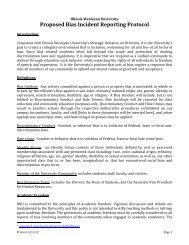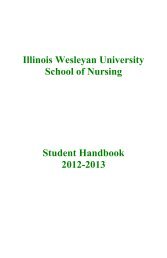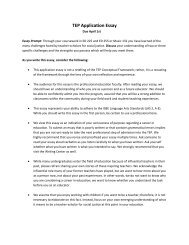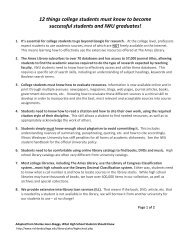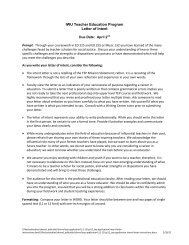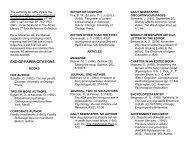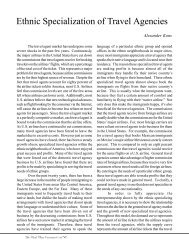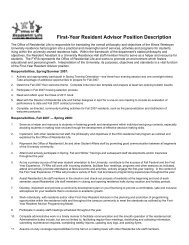You also want an ePaper? Increase the reach of your titles
YUMPU automatically turns print PDFs into web optimized ePapers that Google loves.
<strong>Sigmund</strong> <strong>Freud</strong> - Wikipedia, the free encyclopedia<br />
mind and human behavior, and clinical techniques for attempting to help neurotics.<br />
Early work<br />
A lesser known interest of <strong>Freud</strong>'s was neurology. He was an early researcher on the topic of cerebral palsy, then<br />
known as "cerebral paralysis". He published several medical papers on the topic. He also showed that the disease<br />
existed far before other researchers in his day began to notice and study it. He also suggested that William Little,<br />
the man who first identified cerebral palsy, was wrong about lack of oxygen during the birth process being a<br />
cause. Instead, he suggested that complications in birth were only a symptom of the problem. It was not until the<br />
1980s when his speculations were confirmed by more modern research.<br />
<strong>Freud</strong> was an early user and proponent of cocaine (see <strong>Freud</strong> and Cocaine<br />
(http://www.historyhouse.com/in_history/cocaine/)). He wrote several articles on the antidepressant qualities of<br />
the drug, and he was influenced by his friend and confident, Wilhelm Fleiss, who recommended cocaine for the<br />
treatment of the "nasal reflex neurosis." Fleiss operated on <strong>Freud</strong> and a number of <strong>Freud</strong>'s patients whom he<br />
believed to be suffering from the disorder. Emma Eckstein underwent disastrous nasal surgery by Fleiss.<br />
<strong>Freud</strong> hoped that his research would provide a solid scientific basis for his therapeutic technique. The goal of<br />
<strong>Freud</strong>ian therapy, or psychoanalysis, was to bring to consciousness repressed thoughts and feelings, in order to<br />
allow the patient to develop a stronger ego. Classically, the bringing of unconscious thoughts and feelings to<br />
consciousness is brought about by encouraging the patient to talk in "free-association" and to talk about dreams.<br />
Another important element of psychoanalysis is a relative lack of direct involvement on the part of the analyst,<br />
which is meant to encourage the patient to project thoughts and feelings onto the analyst. Through this process,<br />
called "transference," the patient can reenact and resolve repressed conflicts, especially childhood conflicts with<br />
(or about) parents.<br />
The unconscious<br />
The interpretation of dreams - a<br />
powerful early work of <strong>Freud</strong><br />
Page 3 of 10<br />
Perhaps the most significant contribution <strong>Freud</strong> has made to modern<br />
thought is his conception of the unconscious. During the 19th century the<br />
dominant trend in Western thought was positivism, the claim that people<br />
could accumulate real knowledge about themselves and their world, and<br />
exercise rational control over both. <strong>Freud</strong>, however, suggested that these<br />
claims were in fact delusions; that we are not entirely aware of what we<br />
even think, and often act for reasons that have nothing to do with our<br />
conscious thoughts. The concept of the unconscious was groundbreaking<br />
in that he proposed that awareness existed in layers and there were<br />
thoughts occurring "below the surface." Dreams, called the "royal road to<br />
the unconscious", provided the best examples of our unconscious life,<br />
and in The Interpretation of Dreams <strong>Freud</strong> both developed the argument<br />
that the unconscious exists, and described a method for gaining access to<br />
it. The Preconscious was described as a layer between conscious and<br />
unconscious thought—that which we could access with a little effort.<br />
Crucial to the operation of the unconscious is "repression." According to<br />
<strong>Freud</strong>, people often experience thoughts and feelings that are so painful<br />
that people cannot bear them. Such thoughts and feelings—and<br />
associated memories—could not, <strong>Freud</strong> argued, be banished from the<br />
mind, but could be banished from consciousness. Thus they come to<br />
constitute the unconscious. Although <strong>Freud</strong> later attempted to find<br />
http://en.wikipedia.org/w/index.php?title=<strong>Sigmund</strong>_<strong>Freud</strong>&printable=yes<br />
7/13/2005





